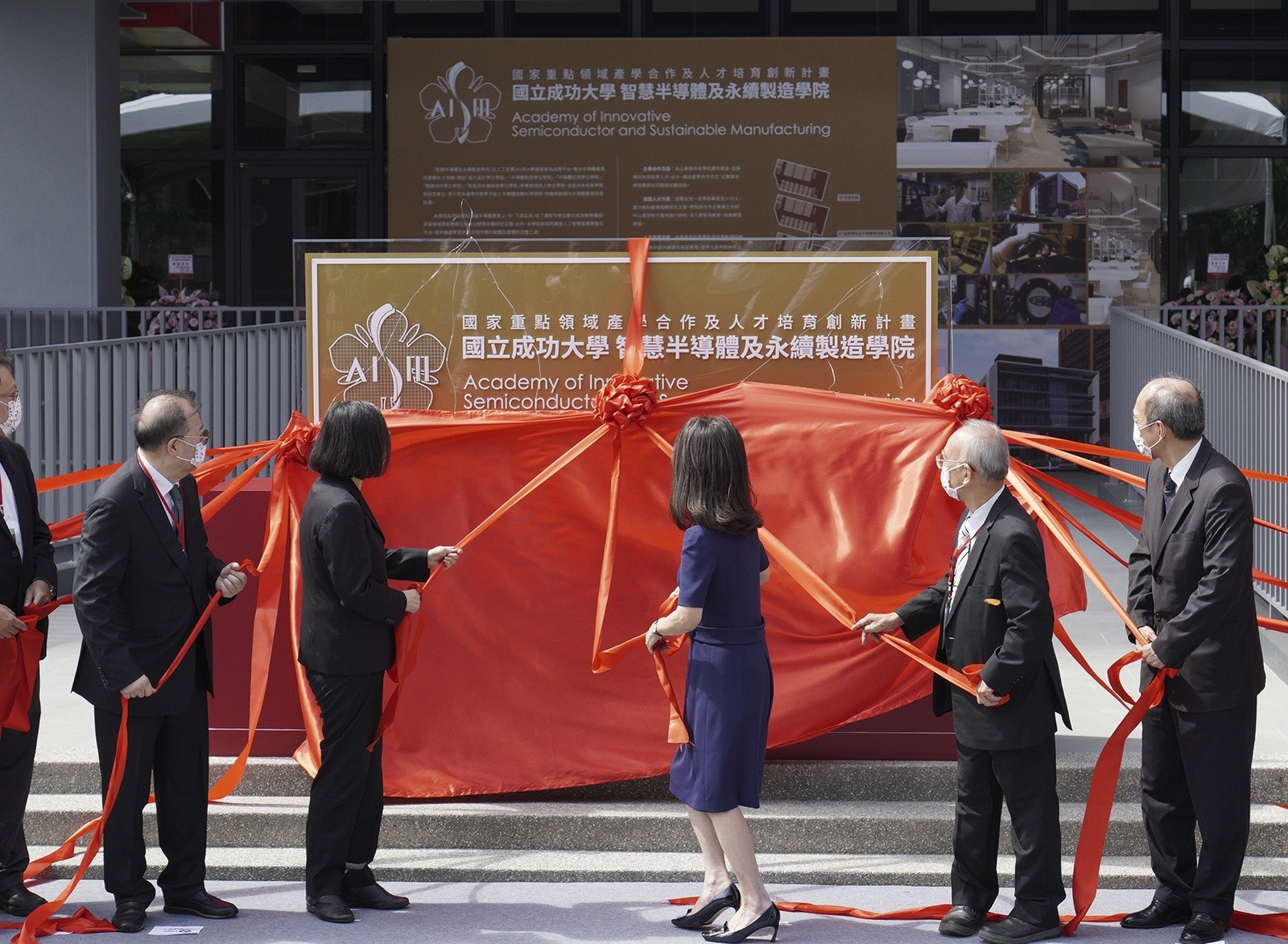
Case Study
The Academy of Innovative Semiconductor and Sustainable Manufacturing
National Cheng Kung University newly established the Academy of Innovative Semiconductor and Sustainable Manufacturing in the 2021 academic year. On October 22, the university held the opening ceremony for the academy under the testament of representatives from industries and academia. According to the 2021 Semiconductor Talent White Paper, in graduates from 2016 to 2022, NCKU graduates take up the highest proportion in semiconductor industries.
Huey-Jen Jenny Su, President of NCKU, emphasized the NCKU core value “Achieve Securely, Prosper Mutually” over its history of 90 years. The NCKU Academy of Innovative Semiconductor and Sustainable Manufacturing has rich hardware resources, with Artificial Intelligence as its backbone and high energy sensitivity in its mind. A new form of learning program is in the making. Partner schools spanning across different fields are invited to join this innovative platform of the country and to cultivate the next generation cross-disciplinary talents.
President Tsai Ing-Wen attended the unveiling ceremony on the 22nd and congratulated NCKU for its two joyous ceremonies. On the same day as the unveiling ceremony, NCKU also held the Groundbreaking Ceremony for its geriatric hospital. This day marks the day NCKU becomes the first university to unveil its semiconductor school among the four universities approved by the Ministry of Education to establish semiconductor schools. In addition to the semiconductor industry, NCKU also has a solid developmental foundation in AI, Circular Economy, and National Defense. The president expressed her high expectations for NCKU to connect with Science Parks in Shalun, Tainan, and Qiaotou to form the most important technology valley of southern Taiwan, continuously pushing the development of semiconductor industry and the innovation and sustainable development of the south.
NCKU is resourceful in industry-academia fields as it has the most collaborations with top domestic enterprises and possesses key technologies to reach net zero carbon emissions, according to the academy. Students are given choices to more practical research topics through collaborative programs with enterprises, in combination with the university’s Colleges of Electrical Engineering & Computer Science, Engineering, and Science, and cross-domain research energy in AI, Sustainable Energy, Smart Machinery, Smart Manufacturing, Circular Economy, Carbon Neutrality, Nanomaterials, Quantum Computer and Big Data. On top of instructors from different departments jointly guiding the students, experts from enterprises will take on the role of instructor for students, who would be given more opportunities to interact with enterprises that are beneficial to their future career plans. The academy nurtures the students’ fundamental abilities and technology foresight.
NCKU Academy of Innovative Semiconductor and Sustainable Manufacturing welcomes its unveiling ceremony on the Tzu-Chiang Campus, on the lawn in front of the Chi-Tuan Building. In the future, the Chi-Tuan Building will serve as the location for the academy’s administration and classrooms, aiming to boost interactions across departments and colleges. The NCKU Technology Building on Tzu-Chiang Campus will serve as the space for student communications; The NCKU-Delta Building in the Southern Taiwan Science Park will serve as the venue for research. With abundant software and hardware resources, the NCKU Academy of Innovative Semiconductor and Sustainable Manufacturing will speedily establish a comprehensive environment for learning and research, accelerating talent cultivation and creating innovative value.
In recent years, the demand for talents in semiconductor technology has sharply increased, leading to many international companies making bigger recruitment plans than before. The NCKU Academy of Innovative Semiconductor and Sustainable Manufacturing collaborates with 15 top enterprises to deliver 5 professional degree programs including Program on Integrated Circuit Design, Program on Semiconductor Technology, Program on Semiconductor Packaging and Testing, Program on Key Materials, and Program on Smart and Sustainable Manufacturing. Applications for recommendation admissions to the academy’s Master’s and PhD programs closed on October 12, with around 178 applicants. The results of the screenings will be released on November 17. Admissions via exams will be held on February 19 and 20, 2022.
The NCKU Academy of Innovative Semiconductor and Sustainable Manufacturing invites Professor Kang-Lung Wang, Raytheon Chair in Electrical Engineering in UCLA, as its Honorary Dean, and Yan-Kuin, Emeritus Professor of Department of Electrical Engineering, to be its Dean. Along with top enterprises, the academy cultivates high-level talents in semiconductor and sustainable manufacturing. The academy designs its courses incorporating AI, Big data, Environmental Sustainability, and Smart Manufacturing while also combining the 5+2 Industry Innovation Plan promoted by the government and the policies on Renewable Energy, Circular Economy and Carbon Neutrality launched by the International Renewable Energy Agency (IRENA).
In terms of sustainable development, a topic with global focus, NCKU works on carbon capture and utilize technologies to boost carbon circular economy and to realize net zero carbon emissions with key technologies in possession, seeking to make great contributions to the country’s reply to the global net-zero challenge. Last month, NCKU has opened Taiwan’s first carbon-negative factory, taking the lead in industrial-academic collaboration for net-zero plan. With concrete plans already in place with domestic enterprises in the petrochemical industry, steel industry, and waste treatment, the university strives to work towards sustainability. Regarding environmental sustainability, the university actively assists high-technology industries in wastewater treatment by integrating traditional biological technologies and novel molecular technologies; regarding energy innovation, the university acts as the research base and works with China Steel to form a national team to develop innovative hydrogen metallurgy technologies.
The curriculum is designed to ensure that students can learn in an all-round way, in response to the increasing complexity of the industry and to prepare for more prospective technology development in the future. Each program also incorporates basic courses on big data and AI to cultivate high-level technology-oriented talents in the industry. The academy is expected to train its students in professional abilities such as analysis, design, integration and research innovation, laying the foundation for conducting academic research and operating in the industry.